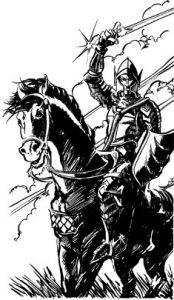The Unbearable Lightness of Empty Shells
 Reading through Tales of the Once and Future King, a collection of Arthurian stories published by Superversives Press, it’s striking how these stories of knightly honor are inseparable from their Christian roots. Even when the action takes place in a strange steampunk fantasy world, the specter of the Holy Ghost looms over the proceedings and lends them a weight all out of proportion to the action.
Reading through Tales of the Once and Future King, a collection of Arthurian stories published by Superversives Press, it’s striking how these stories of knightly honor are inseparable from their Christian roots. Even when the action takes place in a strange steampunk fantasy world, the specter of the Holy Ghost looms over the proceedings and lends them a weight all out of proportion to the action.
To be sure, anyone can slap on some heavy armor and gallivant about the countryside waving a long, sharp stick around, but take away the chivalric code and its rooting in Christian ethics and morality, and you’re left with a guy with a stick. He might be a hero, and he might fight evil with the best of them, but there’s something innately stirring about the noble sacrifices and piety of a man who fights for God first, and himself second.
There’s also something badass about the most powerful force on the field of battle who has put his time and effort and training and talents into the service of God – even if his service is filtered through a lord and king. After years of reading gritty otherworld war stories by guys like Glen Cook and the courtly tales of soulless elves by guys like John C. Wright, reading about knights errant and otherwise whose spiritual might is as strong as their physical might – or even who are tested in such manner – has been an eye-opening experience.
First, because of a realization that so much of what knights represent is ingrained in our culture. Despite centuries of Enlightenment scholarly effort (and especially the efforts of their modern heirs) to cast knights as eternal villains and base cutthroats, they remain the ultimate white hats of the pre-gunpowder days. Give them a strong arm, a deft tongue, and an unflinching disdain for evil, and people will bring a lot of the best kind of baggage along for the ride.
Which explains why paladins (and later Cavaliers) always felt so flat in D&D. Divorced from their roots and sworn to support some vague notion of celestial “good” rather than the rock solid code of the Christian God, they become empty shells of armor with a few magic doodads bolted on for effect. They can be fun to play, and they have their role as front line fighter with a healbot patina, but they don’t narratively punch above their weight the way that their narrative counterparts.
They just don’t have the solid foundation of their narrative counterparts in the Arthurian myths, and it shows.
It’s probably not fixable in the supplement market – the SJWs in the hobby can no more stomach the sight of the cross anywhere near their games than they can form healthy adult relationships. Few players, SJW or not, have the skill to manage a character laden with the social restrictions of a truly holy warrior, and fewer still play at tables where their compatriots would accept such restrictions. Not when they would limit their tank-healer’s effectiveness in play. But adding the visceral punch of a knight in shining armor dedicated to truth, justice, and the Cross to your game is something to consider if you want to add some beefy resonance to your role-playing sessions.
Anyway, Tales of the Once and Future King has certainly shifted the course of my own next fantasy novel. If it doesn’t have strong yet tender and fierce yet protective knights in it, I’m not even going to bother.